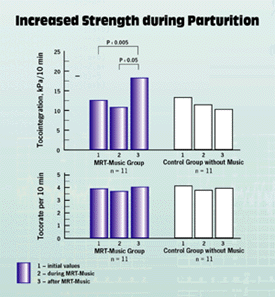In this study three groups of women with an initial uterine inactivity were investigated:
one group (11 women) was treated with relaxing Medical Resonance Therapy Music®, a control group A (11 women) listened to music of Mozart – Symphony No. 28 and Coronation Mass – and a control group B (11 women) did not listen to any music at all.
The music treatment was started in the first phase of labor. Strength and rhythm of uterine contractions were measured three times for about 10 minutes: shortly before listening to the music, in the middle of the one hour music treatment and shortly after finishing the treatment.
Medical Resonance Therapy Music®
Group
Significant changes could only be documented in this group: the initial weak contractions of the uterus increased in strength by 60% on average and got more harmonious in rhythm.
Control Group A and BSignificant changes could only be documented in this group: the initial weak contractions of the uterus increased in strength by 60% on average and got more harmonious in rhythm.
No significant changes in strength and rhythm of uterine contractions were found.
Investigators:
Prof. Dr. med. A. Reznikov
Prof. Dr. med. S. Leush
Dr. med. V. Reznikov

